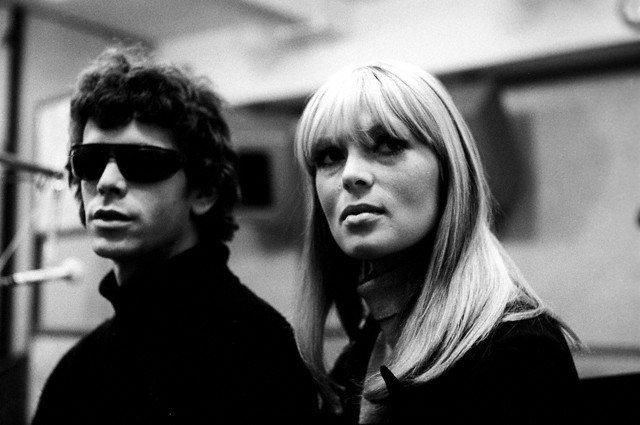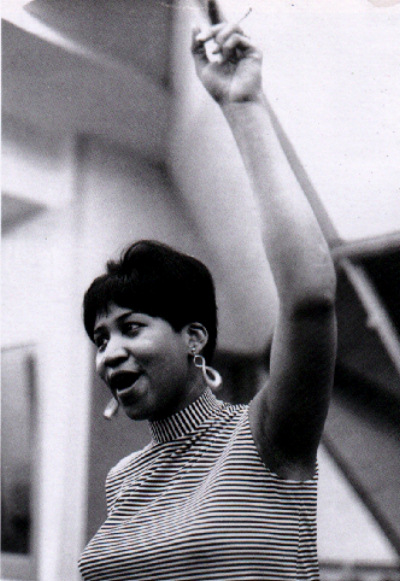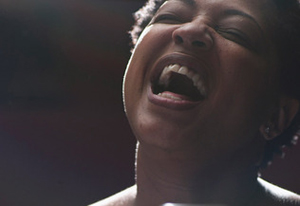 A world without Lou Reed feels inconceivable to me. He’s any punk rock kid’s dad—all of punk rock’s dad, really—and I’d assumed the fact he’d initially survived his drug years meant the heroin had converted his blood to some high-tech preservative that rendered him not only timeless but immortal. God knows his what’s-it-to-you fuckery permanently opened all kinds of roads and minds when it came to mixing and matching genders, races, styles, sorrows. He was the deepest superficial guy rock ‘n’ roll never knew, a tabula rasa of high-low poetry and one-note chords, the reigning king of Open and Shut, not to mention Ugly Is Beautiful. In high school I dressed as Nico partly because it was the closest I could get to Lou. All the way through college, I had one sign on my dormroom door: “LOU IS GOD.” In the first week I moved to NYC, I actually met him. I was ogling a display of his Between Thoughts and Expression in the window of the old 8th Street Barnes and Noble, and turned around to discover him looking at me looking at his book. “I don’t believe it,” I said. “Believe it, dude,” he responded, and sped down the street before I could ruin the purity of the drama. It was at that moment I knew I was supposed to grow old in this Crazy Apple. I do take some solace in imagining that, wherever Lou is now, he’s shoving the 31 years he lived longer than Lester Bangs in the late music critic’s face. But, man. Today I am totally inconsolable about a city, planet, universe without my Lou. From now on it’ll be another loneliness I carry: forever waiting for my man.
A world without Lou Reed feels inconceivable to me. He’s any punk rock kid’s dad—all of punk rock’s dad, really—and I’d assumed the fact he’d initially survived his drug years meant the heroin had converted his blood to some high-tech preservative that rendered him not only timeless but immortal. God knows his what’s-it-to-you fuckery permanently opened all kinds of roads and minds when it came to mixing and matching genders, races, styles, sorrows. He was the deepest superficial guy rock ‘n’ roll never knew, a tabula rasa of high-low poetry and one-note chords, the reigning king of Open and Shut, not to mention Ugly Is Beautiful. In high school I dressed as Nico partly because it was the closest I could get to Lou. All the way through college, I had one sign on my dormroom door: “LOU IS GOD.” In the first week I moved to NYC, I actually met him. I was ogling a display of his Between Thoughts and Expression in the window of the old 8th Street Barnes and Noble, and turned around to discover him looking at me looking at his book. “I don’t believe it,” I said. “Believe it, dude,” he responded, and sped down the street before I could ruin the purity of the drama. It was at that moment I knew I was supposed to grow old in this Crazy Apple. I do take some solace in imagining that, wherever Lou is now, he’s shoving the 31 years he lived longer than Lester Bangs in the late music critic’s face. But, man. Today I am totally inconsolable about a city, planet, universe without my Lou. From now on it’ll be another loneliness I carry: forever waiting for my man.
Archive | Music Matters
You Do Not Mess With the Queen
 There are times when the only singer I can bear to hear is Aretha Franklin. She doesn’t belong to any one of my former relationships. She doesn’t belong to any particular era of my life. She belongs to all of them or, rather, everything belongs to her. I know every one of her songs inside and out, and have been learning them since before I could talk. Our family cat, adopted 18 months after my birth, was named Aretha Franklin Rosman. It’s like that. I have every album recorded by this woman, and most of them on vinyl. Sometimes when I’m feeling blue I just ogle her record covers. She’s unfathomably beautiful—feline and sly-eyed and blowsily ladycurvy—and I know everything divine and earthly rolls through that big, matter-of-factly churchified and cracked-up, sooth-the-savage-beast of a voice. I need her to be strong so I can be strong, and in her music, as far as back as her Columbia Records years, she has never, ever let me down. I don’t care about her personal life, and I really don’t want to have coffee with her, no more than I’d like to have tea with the Queen of England. Royals, especially those who have earned their throne, are best worshipped from afar. I know someday she won’t be on the same planet as me but I’m grateful she has been for so long and even more grateful that her music pours through my ears when I leave that man, tote that barge, straighten that spine, open that heart in all my worst and best moments. Truly, Aretha is the Queen of Soul, and I am lucky to have lived under her reign. We all are.
There are times when the only singer I can bear to hear is Aretha Franklin. She doesn’t belong to any one of my former relationships. She doesn’t belong to any particular era of my life. She belongs to all of them or, rather, everything belongs to her. I know every one of her songs inside and out, and have been learning them since before I could talk. Our family cat, adopted 18 months after my birth, was named Aretha Franklin Rosman. It’s like that. I have every album recorded by this woman, and most of them on vinyl. Sometimes when I’m feeling blue I just ogle her record covers. She’s unfathomably beautiful—feline and sly-eyed and blowsily ladycurvy—and I know everything divine and earthly rolls through that big, matter-of-factly churchified and cracked-up, sooth-the-savage-beast of a voice. I need her to be strong so I can be strong, and in her music, as far as back as her Columbia Records years, she has never, ever let me down. I don’t care about her personal life, and I really don’t want to have coffee with her, no more than I’d like to have tea with the Queen of England. Royals, especially those who have earned their throne, are best worshipped from afar. I know someday she won’t be on the same planet as me but I’m grateful she has been for so long and even more grateful that her music pours through my ears when I leave that man, tote that barge, straighten that spine, open that heart in all my worst and best moments. Truly, Aretha is the Queen of Soul, and I am lucky to have lived under her reign. We all are.
20 Feet From Stardom Is the Absolute Best
20 Feet From Stardom, Morgan Neville’s documentary about backup singers, deserves an objective review because without any qualifications it is the finest film of 2013 thus far. It channels its subjects’ greatest strengths—big wind, an uncanny ear, a fastidious work ethic, a knack for knowing when to sing and when to stop, and an indomitable spirit—and in doing so pulls back the curtain on a rarely considered world, which is the very best function a documentary can fulfill. What’s more, by suggesting with an infectious, clear-eyed joy how this world connects to everything else, it fulfills one of the very best functions of any movie.
But part of what makes this film so extraordinary is that it summons really personal responses. I’ve seen it twice so far and during both screenings the audiences—full of professional critics!—spontaneously burst into applause and tears more than once. God knows I cried through both showings.
At this point I’ll come clean with my own association with the material. My father, an atheist-Jewish computer science professor hailing from lily-white Massachusetts, has had a lifelong romance with R&B, soul, doo-wop, gospel, blues. Certainly he’s not the only Jewish man in his generation to evince a passion for what’s still sometimes known as black music (I won’t even get into how complicated that is) but his commitment has proven steadfast and often endearing. In our family a Sam Cooke or Aretha Franklin album was always spinning on the turntable or pouring out of the car speakers. And at every opportunity he sang those songs himself, warbling in his cracked, earnest falsetto while I did backup.
He taught me young. Starting around 5 or 6, I learned to listen closely so that whenever he’d break into a lead I could chime in with the right oohs, ahhs, babies. I’d croon “No, no, no” while he’d howl Frankie Lymon’s “I’m Not a Juvenile Delinquent.” He’d sing “Respect” and I’d add, “Just a little bit,” just like Aretha’s sisters did. Did I want to sing lead? Not really. I was a daddy’s girl who was fiercely proud to support him as he sang his heart out. But as I began to come into a limelight of my own—around age 11 I started doing some TV spots—my father and I began to part ways. I couldn’t help but observe he preferred to sing lead in his own house, and from this I learned the classic lessons of the backup singer: that sometimes it was better to blend than to shine, that adaptation was necessary for survival, that you had to know when to cut your losses, and that I loved the music for its own sake, regardless of whether I could gain any rewards by doing so.
So I get backup singers. And the dynamite news is that Morgan Neville does, too. He doesn’t trip over himself as he carefully builds the arcs of these individual women’s lives into something that is, fittingly, bigger than the sum of its parts. Starting with a credit sequence in which he slyly reappropriates artist John Baldessari’s work by applying dots to the lead singers in vintage R&B images, Neville draws upon whatever works best to tell this ultimate underdog story. He enlists some of the biggest names in the music business—Sting (poncey as ever), Bruce Springsteen, Stevie Wonder, Mick Freaking Jagger—to lay out the enormity of these women’s contributions to the twin canons of rock and roll and R&B. Wisely, though, he mostly lets the women speak for themselves. Continue Reading →


